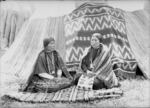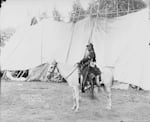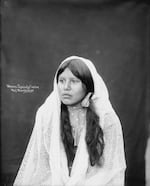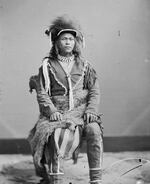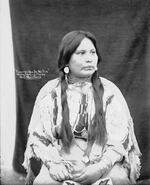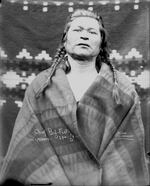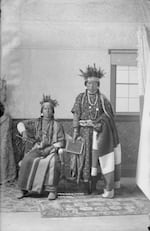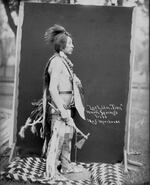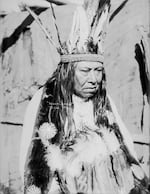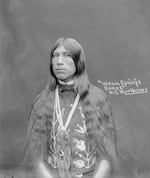
"Warm Springs Brave"
Image # BAE GN 2899 B11 / National Anthropological Archives, Smithsonian Institution
Members of the Confederated Tribes of Warm Springs Tribes took advantage of a "Recovering Voices" grant from the Smithsonian to go to the Washington, D.C., institution to access tribal artifacts, including photos, documents, tools and garments.
Valerie Switzler, the tribe's cultural and heritage director, told Think Out Loud Host Dave Miller that the tribes have been studied for decades.
"The archaeologists and linguists would come and do research on our people. But we never got a copy of those, of what they studied or what they found out," she said. "So, it's been our push for many years to go and find those recordings of our elders, the notes on the language, all of those kind of materials."
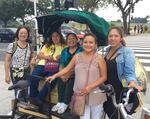
(R to L) Warm Springs tribal members Shayleen Macy; Lori Switzler; Valerie Switzler, Pam Cardenes; and Nariyo Kono, a "linguist friend from Portland State University."
Photo courtesy of Valerie Switzler
Before Switzler and other tribal members left Oregon for D.C., she said she had no idea what they would find at the Smithsonian.
"In fact when we got there, they only had like a couple of boxes and a folder that had Wasco material."
But, she said, once she shared a dozen other names that the tribes were known by, a Smithsonian linguist came back with more than two and a half cartloads of boxes and files, including documents about the Kiksht language.
"We found over 100 pages of documented language material. This is very crucial to us. Especially since our last speaker passed," Switzler said, referencing the 2012 death of Gladys Thompson. "So anything that we find on the languages is like treasure to us. There was also 80 pages of stories, pertinent to our tribe and our language. So you know, that was the biggest gold mine for us, to have access to those materials again."
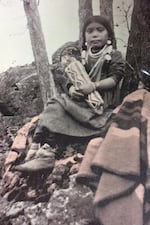
Tribal member and Kiksht teacher Pam Cardenes, who is involved in the effort to bring back the Kiksht language, accompanied Switzler on the trip.
Cardenes found a picture of her great aunt in a big file of photos she was sorting through.
"One of the photos that was in the files was my grandmother's sister," Cardenes said. "I'm thinking she's maybe about 8 or 9 years old. It was really exciting to see that and to recognize that. She was born I believe in 1865, somewhere in there."
Even though they weren't able to bring any of the hundreds of documents, photos, tools and other items home from Washington, D.C., Switzler said the copies and pictures they did bring back are invaluable.
"It touched our heart in a lot of ways," she said. "This is material that our ancestors left for us to look at and to you know, to teach our own kids."

